2014年6月新版小学新标准英语(一年级起点)四年级上册课文文本Module 9
2014年6月新版小学新标准英语(一年级起点)四年级上册课文文本Module 8
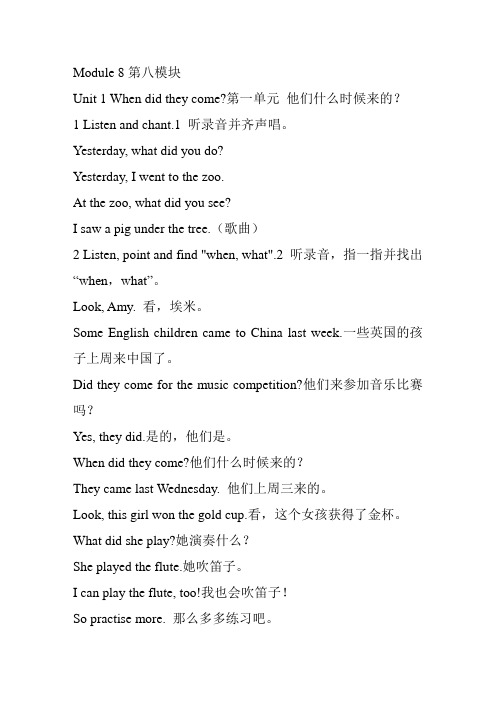
Module 8第八模块Unit 1 When did they come?第一单元他们什么时候来的?1 Listen and chant.1 听录音并齐声唱。
Yesterday, what did you do?Yesterday, I went to the zoo.At the zoo, what did you see?I saw a pig under the tree.(歌曲)2 Listen, point and find "when, what".2 听录音,指一指并找出“when,what”。
Look, Amy. 看,埃米。
Some English children came to China last week.一些英国的孩子上周来中国了。
Did they come for the music competition?他们来参加音乐比赛吗?Yes, they did.是的,他们是。
When did they come?他们什么时候来的?They came last Wednesday. 他们上周三来的。
Look, this girl won the gold cup.看,这个女孩获得了金杯。
What did she play?她演奏什么?She played the flute.她吹笛子。
I can play the flute, too!我也会吹笛子!So practise more. 那么多多练习吧。
Then you will win a competition, too.然后你也会赢得比赛的。
3 Listen and say.3 听录音,说一说。
When did they come?他们什么时候来的?They came last Wednesday.他们上周三来的。
What did she play?她演奏什么?She played the flute.她吹笛子。
2014年6月新版小学新标准英语(一年级起点)四年级上册课文文本Module1
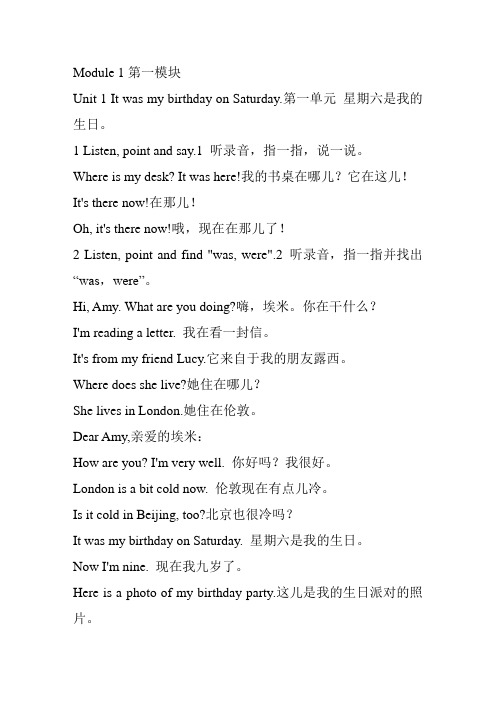
Module 1第一模块Unit 1 It was my birthday on Saturday.第一单元星期六是我的生日。
1 Listen, point and say.1 听录音,指一指,说一说。
Where is my desk? It was here!我的书桌在哪儿?它在这儿!It's there now!在那儿!Oh, it's there now!哦,现在在那儿了!2 Listen, point and find "was, were".2 听录音,指一指并找出“was,were”。
Hi, Amy. What are you doing?嗨,埃米。
你在干什么?I'm reading a letter. 我在看一封信。
It's from my friend Lucy.它来自于我的朋友露西。
Where does she live?她住在哪儿?She lives in London.她住在伦敦。
Dear Amy,亲爱的埃米:How are you? I'm very well. 你好吗?我很好。
London is a bit cold now. 伦敦现在有点儿冷。
Is it cold in Beijing, too?北京也很冷吗?It was my birthday on Saturday. 星期六是我的生日。
Now I'm nine. 现在我九岁了。
Here is a photo of my birthday party.这儿是我的生日派对的照片。
The girl in red is my new friend, Zara. 穿红衣服的女孩是我的新朋友扎拉。
She's got long, black hair.它有着长长的黑发。
She's very nice. 她很好。
Here is another photo of Zara and me. 这儿是另外一张我和扎拉的照片。
2014年6月新版小学新标准英语(一年级起点)四年级上册课文文本Module 4

Module 4第四模块Unit 1Unit 1 Chinese people invented paper.第一单元中国人发明了造纸术。
1 Listen, point and say.1 听录音,指一指,说一说。
What's this?这是什么?It's a boat. 这是船,And it's a bike, too! I invented it.也是自行车!我发明了它。
Wow, you are so clever!哇,你真是太聪明了!2 Listen, point and find "invented".2 听录音,指一指并找出“invented”。
Chinese people invented many important things.中国人发明了许多重要的东西。
Chinese people are very clever.中国人很聪明。
Yes. Chinese people invented paper.是的。
中国人发明了造纸术。
Chinese people invented printing, too.中国人也发明了印刷术。
We print books and newspapers.我们印刷书本和报纸。
That's right.对的。
I printed our class newspaper yesterday.我昨天印刷了我们班的班报。
Oh, where is it?哦,它在哪儿?Look, it's between the chairs.看,在椅子中间。
3 Listen and say.3 听录音,说一说。
Chinese people invented paper.中国人发明了造纸术。
I printed our class newspaper yesterday.我昨天印刷了我们班的班报。
Unit 2 He invented this bicycle.第二单元他发明了这辆自行车。
外研社版英语(新标准)(一年级起点)四年级上册M9教学设计

(三)情感态度目标:积极参与各种课堂学习活动。通过描述事故,教育学生注意安全。
(四)学习策略目标:积极与他人合作,共同完成学习任务。
(五)文化意识目标:进一步注意到中外文化异同。
三、教学重点及难点
(一)重点:继续学习行为动词一般过去时的疑问句,这一内容在前面两个模块已经学习过,本模块主要是用新话题巩固旧知识,因此教师可以就此机会将知识点进行综合和拓展。
4.课件出示故事情节图,进入第二遍听音,任务:听音标号。通过标号,理清事故发生的过程。
5.借助课件对正确顺序的故事情节图逐图解析,解决新知:thirsty(对比thirty)
watermelon (water + melon) carried (原形:carry)
(二)学法:以话题为中心,通过感知、体验、实践、参与和合作等多种方法促使学生多听、多读、多说,形成自主、探究性学习,学生在互动、交流的活动中建立起自信,享受到学习的快乐,成为学习的主人。
第一课时教学设计
一、教材分析
(一)话题:描述一次事故。
(二)语言功能:使用一般过去时的疑问句询问过去的行为,并对自己遭遇的事故进行描述。
《英语》(新标准)(小学一起)四年级上册M9教学设计
一、教材分析
本模块的学习重点是继续学习行为动词一般过去时的疑问句。这一内容在前面两个模块已经学习过,本模块主要就描述自己遭遇的事故这一话题再次对一般过去时进行巩固与练习。新知内容不多,因此教师可以利用这个机会为基础较弱的学生提供更多练习和运用的机会。
2.通过问题了解事故起因:
师:What did he do yesterday?
(He went for abike ridewith Sam.)
一年级起新标准英语第四册课文文本
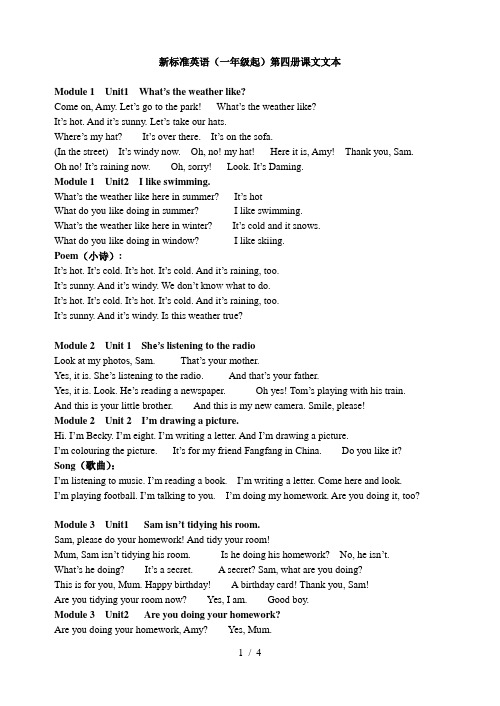
新标准英语(一年级起)第四册课文文本Module 1 Unit1 What’s the weather like?Come on, Amy. Let’s go to the park! What’s the weather like?It’s hot. And it’s sunny. Let’s take our hats.Where’s my hat? It’s over there. It’s on the sofa.(In the street) It’s windy now. Oh, no! my hat! Here it is, Amy! Thank you, Sam. Oh no! It’s raining now. Oh, sorry! Look. It’s Daming.Module 1 Unit2 I like swimming.What’s the weather like here in summer? It’s hotWhat do you like doing in summer? I like swimming.What’s the weather like here in winter? It’s cold and it snows.What do you like doing in window? I like skiing.Poem(小诗):It’s hot. It’s cold. It’s hot. It’s cold. And it’s raining, too.I t’s sunny. And it’s windy. We don’t know what to d o.It’s hot. It’s cold. It’s hot. It’s cold. And it’s raining, too.It’s sunny. And it’s windy. Is this weather true?Module 2 Unit 1 Sh e’s listening to the radioLook at my photos, Sam. That’s your mother.Yes, it is. She’s listening to the radio. And that’s your father.Yes, it is. Look. He’s reading a newspaper. Oh yes! Tom’s playing with his train. And this is your little brother. And this is my new camera. Smile, please!Module 2 Unit 2 I’m drawing a picture.Hi. I’m Becky. I’m eight. I’m writing a letter. And I’m drawing a picture.I’m colouring the picture. It’s for my friend Fangfang in China. Do you like it? Song(歌曲):I’m listening to music. I’m reading a book. I’m writing a letter. Come here and look.I’m playing football. I’m talking to you. I’m doing my homework. Are you doing it, too?Module 3 Unit1 Sam isn’t tidying his room.Sam, please do your homework! And tidy your room!Mum, Sam isn’t tidying his room. Is he doing his homework? No, he isn’t. What’s he doing? It’s a secret. A secret? Sam, what are you doing?This is for you, Mum. Happy birthday! A birthday card! Thank you, Sam!Are you tidying your room now? Yes, I am. Good boy.Module 3 Unit2 Are you doing your homework?Are you doing your homework, Amy? Yes, Mum.Amy, you’re drawing a picture! You’re not doing your homework!Mum, I’m drawing a picture of flowers. It’s my Science homework today!Poem(小诗):Are you doing your homework? Are you listening to music?Are you tidying your room? Are you reading a book?Are you drawing a picture? Are you watching TV?I’m coming to your room. I’m coming to you.Module 4 Unit 1 What are you doing?Hi, Amy. Hi, Lingling. What’s that noise? Are you drinking? No, I’m not.Are you eating? No, I’m not eating. So what are you doing? I’m talking to you.And what’ that noise? Oh, that noise! It’s Tom.What’s he doing? He’s playing with his train.Module 4 Unit 2 What’s he doing?Where’s Lingling, Daming? She’s there. What’s she doing? She’s playing a game with Amy and Sam. What game are they playing? They’re playing five-stones.Poem(小诗):What are you doing? We’re very late. Hurry up! Hurry up! Please finish your cake! What are you doing? Please put on your shoes! Hurry up! Hurry up! There’s no time to lose.Module 5 Unit 1 Lingling is skipping. (It’s playing time)Fangfang, are you sad? Yes, no one is playing with me. Lingling is skipping.Daming and Sam are playing hide-and-seek, Daming is hiding and Dam is seeking.Those girls are playing clapping games. Do you like clapping games? Yes, I do.Well, let’s play clapping games together! One, two, three, four. I am opening the door. Five, six, seven, eight. Hurry up! Don’t be late.Module 5 Unit 2 What are you playing?What are you playing? We’re playing catch. The girls are running.The boys are catching them. Can I play with you? Yes, you can.Poem(小诗):We’re playing in the playground. Some are running races.We’re having lots of fun. Some are playing catch.Running and skipping together, everyone. Some are playing football together in a match.Module 6 Unit 1 I usually play basketball.On Sundays, I usually play basketball. It’s Sunday today. But he’s not playing basketball.I usually help my father. But he’s not helping me today.I usually ride my bike. But he’s not riding it today.And I susally do my homework. He’s not doing his homework now.Today he’s not doing these things. He’s in bed. He’s ill. But I am watching TV.Module 6 Unit 2 We are helping her.My grandma usually cooks. And she usually goes shopping. But today she isn’t doing these things. Today I am cooking. And my father is going shopping. Today is Grandma’s birthday. Today is Grandma’s birthday and we are helping her.Module 7 Unit 1 It’s Children’s Day today.Good morning. Boys and girls. I’m Xiaohu from School TV. It’s Children’s Day today.Look. The children are very happy. Daming is doing a play with some children.Lingling is singing a song. Sam is saying a poem. Amy is dancing.Now, look. Children from Class 2 are coming. They’re doing a dragon dance.Module 7 Unit 2 We’re having a picnic.My name’s Tingting. I’m at the park with my family. We’re having a picnic. My father is flying a kite. My mother is eating. And my grandma is sleeping. I am drawing a picture. The weather is good. It is sunny and warm.Song(歌曲):It’s Children’s Day. Let’s play! Let’s play! It’s Children’s Day today.It’s Children’s Day. I’m happy to say it’s Children’s Day today.Module 8 Unit 1 The train is going up a hill.Hello. I’m on the train now. Good, I’m at the station.The train is going up a hill. Now it’s going down a hill.Now, it’s going past a hospital. Now it’s stopping at the station.I can see you! And I can see you, too!Module 8 Unit 2 We’re turning aroundWe’re going up. We’re going down. We’re turning around.We’re touching the sky. We’re touching the ground. And how we’re turning around again. Song(歌曲):Shake, shake, shake your shoulders. Shake them up and down.Shake, shake, shake your shoe and stamp it on the ground.Module 9 Unit 1 Turn left!What are you going, Sam? I’m going to Daming’s flat.Where is it? It’s in West Lake Road.Excuse me. Where’s West Lake Road. Go straight on! Then turn right!Then turn left! Thank you! You’re welcome. Daming, I’m lost!Where are you? I’m in West Lake Road. I live in East Lake Road. Not West Lake Road. Module 9 Unit 2 Where do you live?Where do you live? I live I Apple Street. And where is Apple Street?Go out of the school. Turn left. Then go straight on. You go past the factory.Then you turn right. That is Apple Street.Poem(小诗):Left foot, right foot, Left foot, right. Marching all day, and marching all night.Go straight on, now turn right. Left foot, right foot, left foot, right.Unit 10 Unit 1 It’s next to the park.Sam, this is my cousin Lin. Nice to meet you. Nice to meet you, too.Excuse me. Where’s the supermarket, please?Go straight on. Then turn left. I t’s next to the park.Excuse me, where’s the zoo? Go straight on. It’s in front of the school.You know the city well, Lin. Of course! I’m a taxi driver! Ha,ha,ha.Unit 10 Unit 2 Where’s the toilet, please?Excuse me. Where’s the toilet, please? The girls toilet is over there, on the left.The boy’s toilet is on the right. Thank you. You’re welcome.Poem(小诗);Look left, look right, look left, again. A car is coming. So start again. Look left, look right, then look left, now. Nothing is coming. Let’s cross now.。
外研版一年级起点四年级上册Module 1 Unit 2 I’ve got a new friend课件1 外研版(一起)
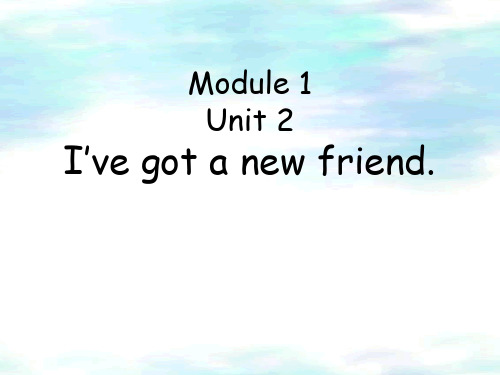
4. What about Meng meng?
She’s got short, black hair. She is very nice.
• Where does Amy live? • Amy lives in …
• Where does Lucy live? • Lucy lives in …
Dear Amy,
It was wonderful to visit you in China.I had a great time.I'm at home in New York now and it's very hot.Please visit me in New York one day.
Love Mary
name Anita John
country 国家
Mexico
America
age 年龄
like
traditional Mexican food traditional dancing football watching TV
basketball
ten computer games
Write to me soon. Tell me about ….
From, xxx
• What’s your name? My name is ___. • How old are you? I’m ___. • Where do you live? I live in ______. • What colour is your hair?My hair is ____. • What food do you like? I like ____. • What sports do you like? I like ____.
小学英语 外研版(一年级起点) 四年级上册 课件+素材

小学英语外研版(一年级起点) 四年级上册课件+素材小学英语外研版(一年级起点) 四年级上册课件+素材作为世界上使用最广泛的语言,英语在许多领域发挥着重要的作用,因此从小学开始它就成为三大主要课程之一。
今天蔡老师分享的是小学英语外研版(一年级起点) 四年级上册课件+素材,让老师们轻松备课,有需要的赶紧下拉至文末下载吧!【资料包目录】Module 1Module 1 Unit1 It was my birthday on Saturday 课件+素材Module1 Unit 2 I’ve got a new friend 课件+素材Module 2Module2 Unit1 I helped my mum 课件+素材Module 2 Unit 2 Amy painted a picture 课件+素材Module 3Module 3 Unit 1 She didn’t walk to school yesterday 课件+素材Module 3 Unit 2 I didn’t play football 课件+素材Module 4Module 4 Unit1 Chinese people invented paper 课件+素材Module 4 Unit 2 He invented this bicycle 课件+素材Module 5Module 5 Unit 1 We went to the Great Wall 课件+素材Module 5 Unit 2 I wore warm clothes 课件+素材Module 6Module 6 Unit 1 It didn’t bee gold 课件+素材Module 6 Uni t 2 He didn’t e back 课件+素材Module 7Module 7 Unit 1 Did you take Amy’s doll? 课件+素材Module 7 Unit 2 Did you see it? 课件+素材Module 8Module 8 Unit 1 When did they e? 课件+素材Module 8 Unit 2 Where did you go yesterday? 课件+素材Module 9Module 9 Unit 1 What happened to your head? 课件+素材Module 9 Unit 2 I bumped my head 课件+素材Module 10Module 10 Unit 1 Go to bed early 课件+素材Module 10 Unit 2 Eat vegetables every day 课件+素材预览结束,资料编号:2779。
Module9(教学设计)外研版(一起)英语四年级上册

3)文化品格
1.教育学生在日常生活中要注意交通安全
2.做任何事情要小心谨慎
4)思维品质
1.培养学生乐于助人团结互助的品质
2.培养孩子用多元化思维解决问题
教学重难点பைடு நூலகம்教学策略
对句型What happened to you?的掌握以及在生活场景中的运用;熟练阅读课文,理解、回答问题。文中涉及到的过去式词汇的学习;询问过去的行为,描述自己遭遇的事故。根据英语课程标准,遵循以学生为中心,以兴趣为支点,以交流为目的,以现实生活为情境的原则,采用任务型的教学模式,教师多引导,学生多参与体验和交流合作。
3.教师提前准备三张活动2中受伤的图片,让学生用抽图的方式抽中一张图片,并且表演出来。教师引导学生询问What happened to you ?
S1: I bumped my head.
S2:I fell over . I hurt my knees.
S 3:I cut my finger.(教师在学生表述过程中纠正发音)
3.理解并运用句型:What happened to ...?及相应的回答句型
课时学习重难点:
对句型What happened to you?的掌握以及在生活场景中的运用;熟练阅读课文,理解、回答问题。文中涉及到的过去式词汇的学习;询问过去的行为,描述自己遭遇的事故。
教学过程
预案(一次备课)
调整(二次备课)
4.listen and say .
5.Do role play in groups.
三.迁移创新
Step 4. practise
1.小组内看图讨论后展示.(可用P52的活动4图片,以及P53活动2图片,也可在PPT加入相关图片)
外研社一年级起点四年级上英语课文(汉语)

昨天,我打扫了我的房间。
我完成了家庭作业。
我的裤子非常脏。
我把它们洗了。
然后我帮助了我的妈妈。
她非常高兴。
大明,你是一个非常好的孩子。
谢谢你,妈妈。
昨天,我打扫了我的房间。
我洗了我的裤子。
然后我帮助了我的妈妈。
上周日,我煮了面条。
他也煮了面条。
昨天,思马特先生煮了面条。
汤姆帮助他。
思马特夫人给奶奶打电话。
萨姆看电视。
埃米画了一幅画。
我完成了我的家庭作业。
你没有完成你的作业。
玲玲星期一通常七点起床。
但是她昨天没有七点起床。
她通常步行去学校。
但是她昨天没有步行去学校。
她通常在学校上英语课。
但是她昨天没有上课。
昨天是国庆节!玲玲看电视并玩玩具。
玲玲昨天没有七点起床。
她没有步行去学校。
她没有在学校上英语课。
昨天,我做了鱼。
但是我没有吃。
在星期日,我通常骑自行车去公园。
我通常在公园里踢足球。
但是我昨天没有骑自行车。
我也没有在公园里踢足球。
昨天下雨了。
我在家里呆着并打扫了所有的房间。
多么无聊的一天啊!这是什么?这是船,也是自行车!我发明了它!哇,你真是太聪明了!中国人发明了许多重要的东西。
中国人很聪明。
是的。
中国人发明了造纸术。
中国人也发明了印刷术。
我们印刷书本和报纸。
对的。
我昨天印刷了我们班的班报。
哦,它在哪儿?看,在椅子中间。
中国人发明了造纸术。
我昨天印刷了我们班的班报。
看这只老鼠。
它在房子旁边。
哦,不!它在猫的前面看这个自行车身边的男人。
他发明了这辆自行车。
他来自英国。
看这两辆车中间的男人。
他发明了这些汽车。
他来自美国。
Module 5你昨天参加了学校旅行吗?是的。
我们去了长城。
花了五十分钟爬到了长城顶。
我们看见了许多山。
我们吃了糖。
我们看见了一些漂亮的植物。
所以,你们玩得很愉快。
是的。
我们还给你买了礼物。
是一副长城的画。
谢谢你,孩子们。
我们去了长城。
我们看见了许多山。
我们吃了糖果。
我们玩得很愉快。
我昨天看见了猪。
他去滑冰。
一只猪去滑冰!哈哈……亲爱的埃米:昨天,我们参加了学校旅行。
我们去滑冰。
我穿了暖和的衣服。
外研社版英语(新标准)(一年级起点)四年级上册M2教学设计

《英语》(新标准)(小学一起)四年级上册M2教学设计3.画一画,自己上周日所做的活动,说一说,明天分享。
(实践性作业)(七)课堂评价本节课以复习服装为切入点,即复习以前学过的服装类的词汇,又引出新的词汇skirt,利用鞋子创设情境,帮助鞋子找主人,最后根据教师的提示,推断鞋子的主人,原来是Lucy(上一模块的新朋友),昨天她洗了鞋子,结果找不到,感谢大家的帮忙。
(八)板书设计:Module 2Unit 1 I help ed my mum.clean ed my room.Yesterday, I finish ed my homework.wash ed them.help ed my mum.第二课时教学设计一、教材分析(一)话题:描述过去的活动(二)语言功能:使用一般过去时的肯定陈述句描述他人过去的行为。
(三)语言结构:Amy painted a picture.二、课时教学目标(一)语言知识目标:学习目标语句Amy painted a picture.及词汇: paint,Mr, phone.(1分钟) 1.听读11-13页内容,达到流利,发音正确。
(听、读作业)2.抄写: paint, Mr, phone .要求书写规范美观。
(书写作业)选做作业:3.搜集一些动词过去式,说一说,复习课时分享。
(实践性作业)作业的布置体现了听说读写四个方面的训练。
课上的学习,课下的延伸,更好地掌握所学内容。
(七)课堂评价本节课从活动1的小猪为切入点,创设情境,对学生进行鼓励和评价。
(八)板书设计:Module 2Unit 2 Amy paint ed a picture.第三课时教学设计一、教材分析课型:Revision and application本模块的功能是使用一般过去时的肯定式谈论自己和他人在过去某一时间所做的事情。
本模块主要围绕过去的活动展开话题,使学生在话题谈论中进一步理解和运用一般过去时。
外研版小学英语(一年级起点)四年级上册【教学课件】Module 4 Unit 1
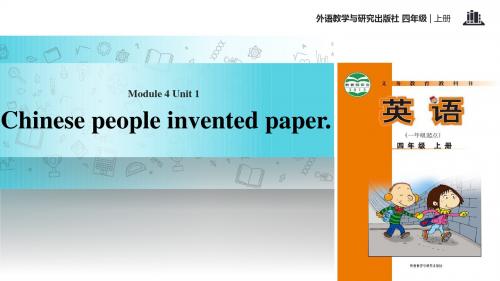
What have you learn today?
Chinese people invented important things. Chinese people invented paper. Chinese people invented printing.
外语教学与研究出版社 四年级 | 上册
Homework
1.听录音,读对话。 2.记住本单元的新单词。 3.查阅资料,看看我们中国还有那些伟大的发明, 试着用英语说说。
谢谢观看!
What important things did Chinese people invent?
Chinese people invented important things. Chinese people invented paper. Chinese people invented printing.
外语教学与研究出版社 四年级 | 上册
1. Take out a piece of paper and your coin. 2. Put the paper on the coin. 3. Then draw on the paper with your pencil.
New words
外语教学与研究出版社 四年级 | 上册
Guess! Who are they?
外语教学与研究出版社 四年级 | 上册
American people
English people
外语教学与研究出版社 四年级 | 上册
Russian people
Chinese people
外语教学与研究出版社 四年级 | 上册
Listen and answer
New words
小学新标准英语一年级起点四年级课文
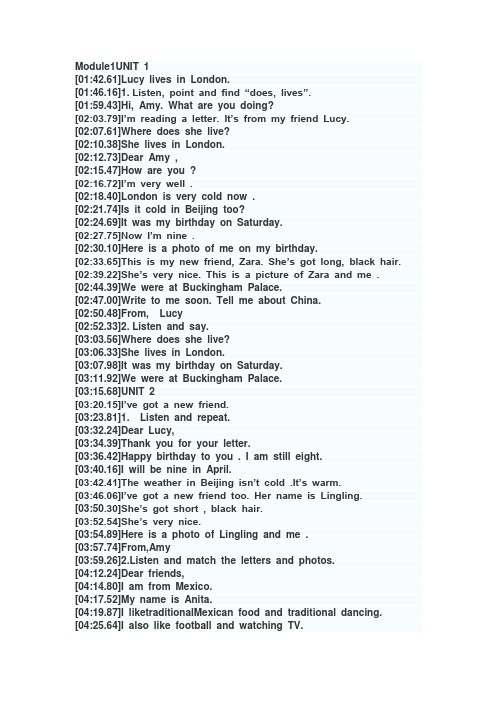
Module1UNIT 1[01:42.61]Lucy lives in London.[01:46.16]1. Listen, point and find “does, lives”.[01:59.43]Hi, Amy. What are you doing?[02:03.79]I’m reading a letter. It’s from my friend Lucy.[02:07.61]Where does she live?[02:10.38]She lives in London.[02:12.73]Dear Amy ,[02:15.47]How are you ?[02:16.72]I’m very well .[02:18.40]London is very cold now .[02:21.74]Is it cold in Beijing too?[02:24.69]It was my birthday on Saturday.[02:27.75]Now I’m nine .[02:30.10]Here is a photo of me on my birthday.[02:33.65]This is my new friend, Zara. She’s got long, black hair. [02:39.22]She’s very nice. This is a picture of Zara and me . [02:44.39]We were at Buckingham Palace.[02:47.00]Write to me soon. Tell me about China.[02:50.48]From, Lucy[02:52.33]2. Listen and say.[03:03.56]Where does she live?[03:06.33]She lives in London.[03:07.98]It was my birthday on Saturday.[03:11.92]We were at Buckingham Palace.[03:15.68]UNIT 2[03:20.15]I’ve got a new friend.[03:23.81]1. Listen and repeat.[03:32.24]Dear Lucy,[03:34.39]Thank you for your letter.[03:36.42]Happy birthday to you . I am still eight.[03:40.16]I will be nine in April.[03:42.41]The weather in Beijing isn’t cold .It’s warm.[03:46.06]I’ve got a new friend too. Her name is Lingling.[03:50.30]She’s got short , black hair.[03:52.54]She’s very nice.[03:54.89]Here is a photo of Lingling and me .[03:57.74]From,Amy[03:59.26]2.Listen and match the letters and photos.[04:12.24]Dear friends,[04:14.80]I am from Mexico.[04:17.52]My name is Anita.[04:19.87]I liketraditionalMexican food and traditional dancing. [04:25.64]I also like football and watching TV.[04:28.80]What about you?[04:30.84]From,Anita[04:34.00]Hi friends,[04:37.52]I am from India.[04:39.88]I am wearing traditional Indian clothes. [04:43.04]I am nine years old.[04:45.60]I like music and dolls.[04:47.45]From,Indrani[04:50.61]Dear Chinese friends,[04:54.87]I like basketball.[04:53.87]I love computer games too .[04:56.51]My favourite food is hamburgers.[05:00.35]I am American. I am ten.[05:04.01]From,John[05:05.76]3. Listen and say .Then sing.Module2 UNIT1[00:08.49]I helped my mum.[00:10.84]1. listen, point and find words ending in “-ed”. [00:24.71]Yesterday, I cleaned my room.[00:27.77]I finished my homework.[00:31.22]I washed my trousers.[00:34.98]They were very dirty.[00:37.12]Then I helped my mum.[00:40.49]Mum was very happy.[00:43.83]Your are a very good boy, Daming.[00:46.79]Thank you, Mum.[00:48.35]2. Listen and say.[01:00.11]Yesterday, I cleaned my room.[01:03.56]I washed my trousers.[01:08.00]Then I helped my mum.[01:12.44]UNIT 2[01:18.60]Amy painted a picture.[01:22.16]1. Listen and repeat.[01:21.16]Yesterday, Mr Smart cooked noodles.[01:26.20]Tom helped him.[01:29.44]Ms Smart phoned Grandma.[01:34.40]Sam watched TV.[01:38.66]Amy painted a picture.[01:42.81]3. Listen and say. Then chant.[01:57.07]She painted a picture.[01:59.11]She watched TV.[02:00.97]She played the flute.[02:03.32]She played with me.[02:04.57]He listened to music.[02:07.21]He played football.[02:09.17]He helped his mother.[02:10.63]There were biscuits for all.Module3UNIT 1[00:05.80]She didn’t walk to school yesterday.[00:12.36]1. Listen, point and find “didn’t”.[00:24.71]Lingling usually gets up at half past six on Mondays.[00:30.35]But she didn’t get up at half past six yesterday.[00:34.19]She usually walks to school.[00:37.96]But she didn’t walk to school yesterday.[00:41.59]She usually learns English and Maths.[00:45.64]But she didn’t learn these th ings yesterday.[00:48.80]Yesterday was National Day![00:53.55]Lingling watched TV and played with her toys.[01:02.62]2. Listen and say.[01:15.96]Lingling didn’t get up at half past six.And she didn’t walk to school.[01:23.80]She didn’t learn English a nd Maths.[01:28.24]UNIT 2[01:34.62]I didn’t play football.[01:36.86]1. Listen and repeat.[01:46.61]On Sundays, I usually paly footall in the park .[01:50.73]But I didn’t play football yesterday.[01:54.08]And I usually ride my bike .[01:57.55]But I d idn’t ride it yesterday.[02:00.61]It was raining ![02:02.54]I stayed at home.[02:04.21]3. Listen and say .Then sing.Module4UNIT 1[00:08.10]Chinese people invented paper.[00:12.25]1. Listen, Point and find “invented”.[00:25.29]Chinese people invented important things.[00:28.73]Yes that’s right.[00:31.97]Chinese people are very clever, you know.[00:35.42]Chinese people invented pager.[00:39.58]Paper? Like this?[00:41.93]Yes.[00:42.97]Chinese people invented printing too.[00:48.22]We print books and newspapers.[00:50.49]That’s right.[00:54.73]Look, I printed this newspaper.[00:56.69]Ha, ha ,ha.[00:59.04]2. Listen and say .[01:11.50]Chinese people invented paper.[01:16.46]Chinese people invented printing.[01:20.82]I printed this newspaper.[01:25.50]UNIT 2 He invented this bicycle in 1839.[01:37.36]1. Listen and repeat.[01:46.29]Look at this picture.[01:49.04]It’s a bicycle.[01:51.49]Look at the man on the bicycle.[01:54.96]He was English.[01:57.00]He invented the bicycle in 1839.[02:04.37]3. Listen and say. Then sing.Module5 UNIT 1[00:09.69]We went to the Great Wall.[00:12.54]1. Listen, point and find “went, saw, ate, had, bought”. [00:29.91]Was it a school trip yesterday?[00:33.75]Yes. We went to the Great Wall.[00:36.62]We climbed to the top.[00:40.46]And we saw lots of mountains.[00:44.23]We ate biscuits.[00:47.99]And we ate apples.[00:50.34]So, you had a good time ,boys![00:55.04]Yes. And we bought you a present.[00:57.86]It’s a picture of the Great Wall .[01:02.22]Thank you,boys.[01:04.57]2. Listen and say.[01:14.92]We went to the Great Wall.[01:17.58]We saw lots of mountains.[01:22.44]We ate apples.[01:26.57]We had a good time.[01:31.61]UNIT 2[01:38.46]I wore warm clothes.[01:41.93]1. Listen and repeat.[01:51.60]Dear Amy,[01:53.14]Yesterday, we went on a school trip.[01:57.37]We went ice-skating.[02:00.19]I wore warm clothes-trousers and a sweater.[02:05.52]The ice was very cold.[02:08.16]First, I fell over.[02:11.11]But it didn’t hurt .[02:13.25]Then I learnt to skate .[02:15.39]It was easy![02:17.35]And I didn’t fall over again![02:20.02]It was really fun.[02:22.26]From,Lucy[02:24.93]3. Listen and say. Then sing.Modale6 UNIT 1[00:31.69]It didn’t make gold.[00:34.27]1. Listen, point and find “didn’t”.[00:48.82]Ma Liang was a good boy .[00:51.38]He helped people.[00:53.13]He had a paintbrush .[00:56.29]It was magic.[00:58.33]This old woman didn’t have food.[01:02.46]So Ma Liang painted food .[01:04.91]Then the food was real.[01:07.55]There was a bad man.[01:10.61]He didn’t help people.[01:12.96]He took Ma Liang’s magic paintbrush.[01:16.20]The bad man didn’t have gold.[01:19.86]So he painted gold with the magic paintbrush. [01:22.49]But it didn’t make gold .[01:25.68]It made a snake[01:27.17]2. Listen and say.[01:43.84]This old woman didn’t have food.[01:47.57]The bad man didn’t help people.[01:52.54]The magic paintbrush didn’t make gold.[01:57.81]It made a snake.[01:59.67]UNIT 2[02:06.15]He didn’t come back.[02:08.71]1. Listen and repeat.[02:17.56]The and man was engry.[02:21.11]The magic paintbrush didn’t help him.[02:24.27]It only helped Ma Liang.[02:27.72]He took Ma Liang away.[02:31.48]“I want a big ship,”said the bad man.[02:33.00]“You paint it !”[02:35.53]so Ma Liang painted the ship.[02:39.19]Then the ship was real.[02:42.35]The bad man went to sea in his ship.[02:41.35]But he didn’t come back.[02:43.99]3. Listen and say . Then chant.[02:58.95]Georgy Porgy Was a naughty boy.[03:01.38]He was bad to the girls And broke their toys.[03:05.64]But when the boys Came out to play,Georgy Porgy Ran a way.Module7 UNIT 1[00:08.20]Did you break your toy?[00:10.92]1. Listen, point and find “did, didn’t”.[00:24.56]Mum, Tom is crying![00:36.10]Did you fall, Tom?[00:41.46]No, I didn’t.[00:44.62]Did you break your toy?[00:48.38]No, I didn’t.[00:51.02]Did you see a scary thing ?[00:56.29]Yes, I did.[00:59.01]I saw a monster on the TV![01:03.92]Don’t worry, Tom.[01:06.14]2. Listen and say.[01:21.40]Did you fall?[01:23.83]No, I didn’t.[01:26.86]Did you see a scary thing?[01:29.89]Yes, I did.[01:32.21]UNIT 2[01:39.08]There were three children.[01:42.61]1. Listen and repeat.[01:51.26]There was a big monster. It had three heads.[01:56.72]There were three children.[02:00.66]The monster wanted to eat the children.[02:05.39]The children ran away .[02:08.34]Then I cried![02:10.51]Look , Tom . The monster didn’t eat the children.[02:16.25]Oh, good![02:19.21]3. Listen and say . Then chant.[02:34.25]There was an old woman.[02:35.79]She lived in a shoe.[02:38.25]She had lots of children.In face , twenty-two.[02:42.38]She gave them soup and she gave them bread.[02:46.82]She kissed them good night and put them to bed.Module8 UNIT 1[00:08.88]What did she play?[00:11.94]1. Listen, point and find “what, when”.[00:25.81]Look, Amy. Some English children came to China last wee k.[00:31.40]Did they come for the music competition?[00:33.85]Yes, they did.[00:35.71]When did they come ?[00:38.64]They came last Wednesday. Look, this girl won a gold cup. [00:44.28]What did she play?[00:47.52]She played the flute.[00:48.98]I can play the flute too![00:53.00]So practise a lot. Then you will win a competition too! [01:09.56]2. Listen and say.[01:20.33]When did they come?[01:22.68]They came last Wednesday.[01:24.92]What did she play ?[01:28.37]She played the flute.[01:29.94]UNIT 2[01:36.76]Where did you go ?[01:39.40]1. Listen and repeat.[01:49.11]Yesterday was a holiday. Where did you go ?[01:53.76]I went to the zoo.[01:55.72]What did you see ?[01:58.86]I saw lions and tigers.[02:01.50]Where did you go , Tingting?[02:05.47]I didn’t go out . I stayed at home.[02:09.12]3. Listen and say . Then chant.[02:23.88]What did you do yesterday,[02:26.44]Where did you go,[02:28.19]And where did you play ,[02:29.84]What did you see,[02:31.69]And what did you hear,[02:33.55]When I was out at work, my dear?Module9 UNIT 1[00:08.49] What happened to you?[00:10.63]1. Listen, point and find “happened, went, bought, put , fell”. [00:26.88]What happened to you, Daming ?[00:31.45]Yesterday Sam and I went for a bike ride.[00:35.27]We were hungry and thirsty.So we bought a watermelon. [00:41.48]Sam put the watermelon on his bike.[00:45.58]And what happened?[00:47.73]Then Sam fell off his bike. And I fell on the watermelon![00:53.45]Ha ,ha ,ha.[00:56.45]2. Listen and say .[01:09.88]We were hungry and thirsty. So we bought a watermelon. [01:14.55]What happened?[01:16.51]Sam fell off his bike. And I fell on the watermelon.[01:21.19]UNIT2[01:27.35]I bumped my head.[01:30.51]1. Listen and repeat.[01:40.47]What happened to you?[01:43.00]I bumped my head.[01:44.67]I feel over . I hurt my knee.[01:48.62]I cut my finger.[01:50.65]3. Listen and say .Then sing.Module10 UNIT 1[00:07.60]I’ve got a stomach ache.[00:10.66]1. Listen, point and find “I’ve got”.[00:23.01]At the Doctor’s[00:25.97]Sam Smart. Come in , please![00:31.22]What’s the matter?[00:34.09]I’ve got a stomach ache.[00:36.73]What did you eat yesterday?[00:40.25]I ate chocolate biscuits.[00:43.02]How many biscuits did you eat?[00:47.10]…I ate thirty biscuits.[00:49.55]Thirty biscuits! That’s too many ! Go home and take this medicine.[00:58.51]OK. Thank you, doctor.[01:00.63]2. Listen and say .[01:14.89]What’s the matter?[01:16.85]I’ve got a stomach ache.[01:19.02]What did you eat yesterday?[01:18.02]I ate chocolate biscuits.[01:20.48]UNIT 2[01:26.64]Wang Fei’s got a cold.[01:29.80]1. Listen and repeat.[01:39.55]Li Jie is at home . He’s got a head ache.[01:45.50]Wang Fei’s got a cold . He didn’t go to school.[01:53.26]Shanshan isn’t at school. She’s got a toothache.[02:00.99]And Mingming’s got a fever. She stayed at home.[02:07.81]3. Listen and say . Then sing.。
《英语》(新标准)(小学一起)-四年级上册-M3-山东-青岛-薛雅丽
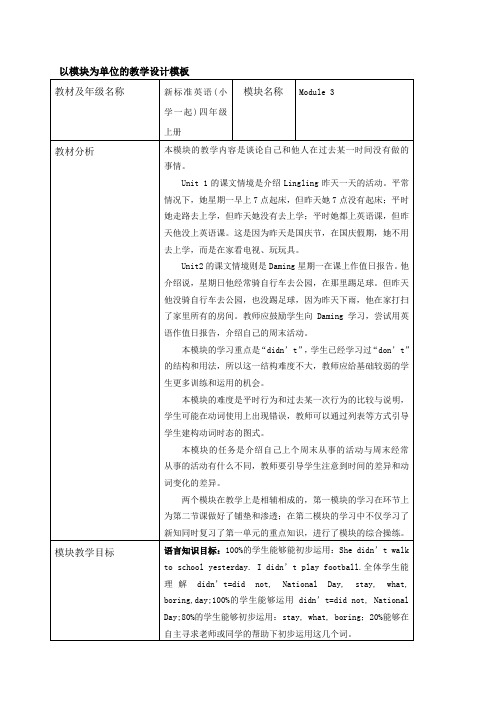
以模块为单位的教学设计模板教学重点与难点学习重点是“didn’t”的运用;难点是注意到时间的差异和动词变化的差异。
教学辅助CD-ROM;PPT;单词卡片;实物教学方法TPR; 直观教学法;讨论法;演示法;谈话法教学内容教学活动设计意图教师活动学生活动Step 1: Warm up and lead in 1.Greeting.2.Free talk.T:What do you usually do on Mondays?(question chain)S1: I usually...What do you usuallydo on Mondays?S2: ...通过问题链讨论学生周一经常做什么,一方面复习巩固了学生学习的已有知识,同时也为本节课的学习做好铺垫。
再次,通过互相提问问题培养学生的提问意识。
Step 2: Presentation 1.T:What does Lingling usually do onMondays?Watch the CD-ROM and answer Q:通过第一遍录音,引导学生回顾之前学习的usually句型,同时使学生对文本内容进行初步感知,调动学生的思维参与,并适时渗透情感教育经常做有意义的事情。
4.Guessing game.5.Reading.(True or false.) 源的调整使用,让知识学习更加的有效。
通过小组分工合作做这一阅读练习,一方面可以培养学生的合作意识,同时也可以在这道题的练习中给学生相应的阅读策略指导。
Step 4 Summary What we have learned today? 与学生一起回顾复习本节课所学的主要内容。
Classroom Assessment 分组竞赛评比培养学生的竞争意识,辅助教学,培养学生良好的学习习惯。
家庭作业:1.Listen and imtate the dialogue for 5 times .2.Copy M3U1 to write a new story about yourself.板书设计: Module 3 Unit 1 She didn’t walk to school yesterday.第三课时教学设计教材分析Unit2的课文情境则是Daming星期一在课上作值日报告。
外研社(一起)四年级上册英语Module2 Unit 1 I helped my mum

I helped my mum .
精品 PPT 可修改
1
ir [ə:]
shirt
skirt girl bird
精品 PPT 可修改
2
Learning Task
1.You will get to know the past tense of verbs. 2. You can talk about what you or others did.
15
The bird wanted to fly .
精品 PPT 可修改
16
But Mole didn’t want it to fly .
精品 PPT 可修改
17
Mole put the bird into精t品hPPeT可c修a改 ge .The bird was sad18 .
One day , grandpa 精品PPT可修改 came to visit . 19
精品 PPT 可修改
23
Activity 4 Find out the correct pictures
Daming cleaned his room . Daming finished his homework . Daming washed his trousers . Daming 精品 PPT 可修改 helped his mum . 24
精品 PPT 可修改
7
精品 PPT 可修改
8
Homework
1.Read the text . 2. Copy the sentences.
3. Write down what you did for your mum.
Module6Unit1Itdidn'tbeegold(教案)外研版(一起)英语四年级上册(1)

《英语》(外研社新标准)(一年级起点)四年级上册Module 6 Unit1 It didn’t become gold.一、教材分析本课是外研社新标准英语(一起)四年级上册M6一般过去时讲故事。
四年级的小学生理解并运用一般过去时态难度程度不大。
但本课的学习重点是含有不规则动词过去式的否定句,要学生理解并掌握。
因此,教师课上需要请先学生感知,再进一步理解运用。
二、学情分析四年级学生年龄十岁左右,生性活泼好动,喜欢直观形象思维。
这时学生对英语学习已经有了一定的经验并养成了良好的学习习惯,形成了有效的学习策略,他们对英语学习有着浓厚的兴趣,渴望获得更多的锻炼机会,因此采用“话题牵引,情景体验”将是本课的主要学习方法,通过用英语讲故事的话题拓展学生们的思维,提升学生们的核心素养。
三、教学目标1、语言知识目标功能:使用行为动词一般过去时讲故事。
语法:全体学生运用It didn’t become gold.词汇:became , gold, magic, paintbrush, real, bad, took2、语言技能目标听:全体学生能听懂:It didn’t become gold.说:全体能说:It didn’t become gold.读:全体学生认读:became , gold, magic, paintbrush, real, bad, took看:全体学生能够看懂故事中的配图,并且会从图片中发现信息、提取信息。
写:全体学生能根据情节的发展续写故事。
3、情感态度学生能积极在小组活动中与他人进行英语交流,懂得分享,懂得要做善良和有帮助的孩子。
4、学习策略尝试阅读英语故事及其他英语课外读物5、文化意识通过读民间故事进一步注意到中外文化异同四、教学重、难点1、重点行为动词一般过去时态的否定形式:It didn’t….2、难点不规则动词的变化形式五、教学准备PPT课件,教材,CD-ROM,教学卡片。
六、教学过程(一)导入Warm-up and lead in1. Free talkT: Do you like stories? What stories do you know?S: I like…2. Watch a video about stories.( 微课)3. Guessing game:T: Look and guess: What story is it?4. Lead in.T: Today,we’ll read a Chinese traditional fable story.[设计意图] 通过故事的讨论,了解故事分类,激发学生的学习兴趣,为课文的学习做好情感的铺垫。
204年6月新版小学新标准英语一年级起点四年级上册课文文本Module4

204年6月新版小学新标准英语一年级起点四年级上册课文文本Module4As an AI language model, I'm unable to access specific textbooks or materials. Therefore, I am unable to provide you with the exact content of the Module 4 text from the revised edition of the primary school English textbook you mentioned. However, I can assist you in discussing a general topic related to English language learning for first graders. Below is a sample article about the importance of daily English practice for young learners. Please note that the content below does not specifically correspond to the Module 4 text you mentioned.Title: The Importance of Daily English Practice for Primary School StudentsIntroduction:English language learning plays a significant role in today's interconnected world. For primary school students, developing a solid foundation in English from the early years is crucial. In this article, we will explore the importance of daily English practice for young learners.Building Vocabulary:Learning English vocabulary is an essential aspect of language acquisition. Daily English practice allows students to expand their vocabulary through exposure to new words and phrases. By incorporating vocabulary learning into the daily routine, children can acquire and retain words more effectively.Enhancing Speaking Skills:Regular English practice provides ample opportunities for students to improve their speaking skills. Engaging in simple conversations, reciting rhymes, and singing English songs are effective ways to develop fluency and pronunciation. Through constant practice, young learners gain confidence in expressing themselves in English.Improving Listening Comprehension:Listening comprehension is a fundamental skill in language learning. By engaging in daily English activities, students are exposed to different accents, intonations, and speech patterns. This exposure helps them develop better listening skills, enabling them to understand spoken English more accurately.Encouraging Reading Habit:Reading is a gateway to language proficiency. Daily English practice should involve reading activities such as reading aloud, story time, or independent reading. Encouraging students to explore English books, newspapers, or magazines boosts their reading comprehension, expands their vocabulary, and enhances their overall language skills.Writing Practice:Writing is a crucial skill that complements other language abilities. By engaging in daily writing tasks such as journaling, sentence formation, or short paragraph writing, students reinforce their understanding of grammar rules, sentence structures, and vocabulary usage. Regular writing practice also nurtures creativity and critical thinking.Cultural Awareness:English practice offers young learners the opportunity to explore different cultures and traditions. Through activities like watching English cartoons, celebrating international festivals, or learning about famous English-speaking personalities, students develop cultural sensitivity and broaden their global outlook.Conclusion:Daily English practice is essential for primary school students to develop a strong foundation in the language. By incorporating vocabulary building, speaking, listening, reading, writing, and cultural activities into their routine, young learners can enhance their English language proficiency, expand their knowledge, and prepare themselves for future academic and personal growth. Encouraging regular English practice from an early age sets the stage for success and opens doors to a world of opportunities for our young learners.。
四年级上册英语- Module2 Unit 1 I helped my mum. 外研社PPT课件

Mole put the bird into the cage .The bird was sad .
One day , grandpa came to visit .
They went for a walk to ห้องสมุดไป่ตู้he top of the hill .
Mole felt he wanted to fly .
Activity 5 Do a survey :What did you do yesterday ?
finish homework play football / basketball
play computer games wash the shirt
play the flute
clean the room
Mole took the baby bird home .
Mole’s friends helped him find the food .
The baby bird grew up .
The bird wanted to fly .
But Mole didn’t want it to fly .
Homework
1.Read the text . 2. Copy the sentences. 3. Write down what you did for your mum.
Thank you
Activity 7 Read a story and finish the story
Mole found a baby bird .
OMBnouMeltedoTMaltheoyoeofl,ekebgladtrhbaihdeynendbbw’paitraabwdnycagtabenrdmiterwidtetohttuoofoplyvmf.li.ysei.t. .
人教版小学英语(一年级起点)四年级上册课文

人教版小学英语(一年级起点)四年级上册课文人教版小学英语(一年级起点)四年级上册课文音频-4课文录音字幕及翻译[00:00.64]Lesson 3 第三课[00:02.42]A Read and match. 读并匹配。
[00:06.65]All my friends like sports. 我所有的朋友都喜欢运动。
[00:09.56]Yaoyao is good at roller-skating. 瑶瑶擅长滑旱冰。
[00:12.53]Joy is good at jumping rope. 乔伊擅长跳绳。
[00:15.53]Mike often plays basketball after school. He is good at it. 迈克经常放学打篮球。
他擅长打篮球。
[00:21.56]Binbin often plays ping-pong with his father. 彬彬经常和爸爸一起打乒乓球。
[00:25.90]They are both good at it. 他们都很擅长打乒乓球。
[00:27.45]What about me? 我呢?[00:29.84]I often run from home to school, because I often get up late. 我经常从家跑步到学校,因为我经常睡懒觉。
[00:34.42]I am good at running. 我擅长跑步。
人教版小学英语(一年级起点)四年级上册课文音频-5课文录音字幕及翻译[00:00.92]Let's Spell 一起拼读吧。
[00:03.40]A Listen, point and repeat. 听,指并重复。
[00:08.39]or[00:12.53]fork[00:15.92]corn[00:19.72]horse[00:24.31]port[00:28.80]fort[00:31.99]lord[00:42.24]B Listen and circle. 听和画圈。
外研版小学英语(一年级起点)四年级上册【教学课件】Module 6 Unit 1
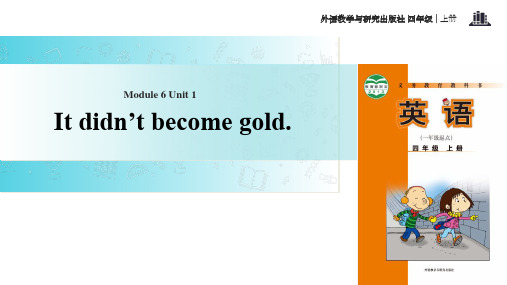
But it didn’t become gold. It became a snake!
gold n. 金子
Let’s think
外语教学与研究出版社 四年级 | 上册
Questions: Why did the paint brush become a snake? Why didn’t it become gold?
外语教学与研究出版社 四年级 | 上册
Do you know about Ma Liang?
Presentation
The story of Ma Liang
外语教学与研究出版社 四年级 | 上册
Long, long ago, there was a good boy. His name was Ma Liang. He helped people.
have—had paint—painted make—made take—took do—did
外语教学与研究出版社 四年级 | 上册
Homework
外语教学与研究出版社 四年级 | 上册
1. 读一读课文。 2. 和朋友继续排练马良的故事。 3. 抄一抄课文中的动词以及它们的过去时。
谢谢观看!
have→didn’t have paint→painted become→became is→was take→took
The story of Ma Liang
外语教学与研究出版社 四年级 | 上册
The bad man didn’t have gold. So he painted gold with the magic paintbrush.
Answers:
Because the magic paintbrush only helps good people, it doesn’t help bad ma
四年级上册外研版一年级起点七模块课文
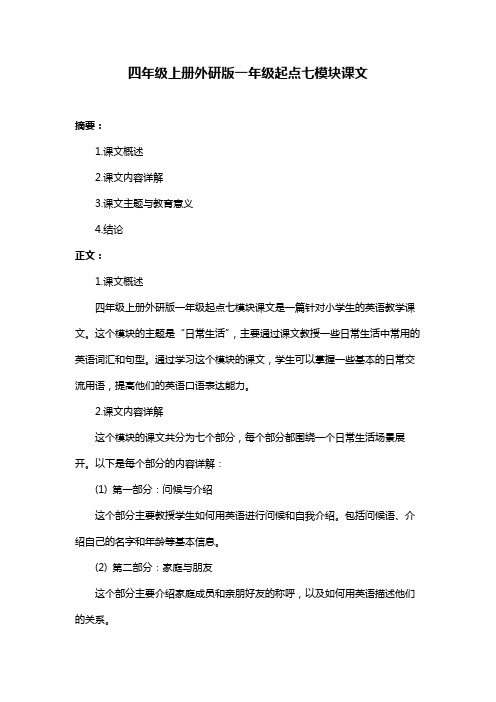
四年级上册外研版一年级起点七模块课文摘要:1.课文概述2.课文内容详解3.课文主题与教育意义4.结论正文:1.课文概述四年级上册外研版一年级起点七模块课文是一篇针对小学生的英语教学课文。
这个模块的主题是“日常生活”,主要通过课文教授一些日常生活中常用的英语词汇和句型。
通过学习这个模块的课文,学生可以掌握一些基本的日常交流用语,提高他们的英语口语表达能力。
2.课文内容详解这个模块的课文共分为七个部分,每个部分都围绕一个日常生活场景展开。
以下是每个部分的内容详解:(1) 第一部分:问候与介绍这个部分主要教授学生如何用英语进行问候和自我介绍。
包括问候语、介绍自己的名字和年龄等基本信息。
(2) 第二部分:家庭与朋友这个部分主要介绍家庭成员和亲朋好友的称呼,以及如何用英语描述他们的关系。
(3) 第三部分:学校生活这个部分主要教授学生如何用英语描述自己的学校、班级、老师和同学等与学校生活相关的内容。
(4) 第四部分:日常生活这个部分主要教授学生如何用英语描述日常生活中的一些常见场景,如起床、吃饭、洗澡、睡觉等。
(5) 第五部分:兴趣爱好这个部分主要教授学生如何用英语描述自己的兴趣爱好,如喜欢运动、阅读、绘画等。
(6) 第六部分:节假日这个部分主要教授学生如何用英语描述一些重要的节假日,如春节、圣诞节、中秋节等。
(7) 第七部分:日常生活习惯这个部分主要教授学生如何用英语描述一些良好的生活习惯,如早睡早起、讲卫生等。
3.课文主题与教育意义这个模块的课文主题是“日常生活”,通过学习这个模块的课文,学生可以掌握一些基本的日常交流用语,提高他们的英语口语表达能力。
此外,这个模块的课文还可以帮助学生了解不同国家和地区的文化,培养他们的跨文化交际能力。
对于学生的语言学习和素质教育都具有重要意义。
4.结论四年级上册外研版一年级起点七模块课文是一个针对小学生的英语教学课文,主要教授一些日常生活中常用的英语词汇和句型。
- 1、下载文档前请自行甄别文档内容的完整性,平台不提供额外的编辑、内容补充、找答案等附加服务。
- 2、"仅部分预览"的文档,不可在线预览部分如存在完整性等问题,可反馈申请退款(可完整预览的文档不适用该条件!)。
- 3、如文档侵犯您的权益,请联系客服反馈,我们会尽快为您处理(人工客服工作时间:9:00-18:30)。
Module 9第九模块
Unit 1 What happened to your head?第一单元你的头怎么了?
1 Listen, point and say.1 听录音,指一指,说一说。
What happened?发生什么了?
I fell off the tree.我从树上掉下来了。
What did you do in the tree?你在树上做了什么?
I...我……
2 Listen, point and find "Did you...?"2 听录音,指一指并找出“Did you...?”
What happened to your head, Daming?大明,你的头怎么了?Oh, Sam and I went for a bike ride yesterday.哦,我和萨姆昨天去骑自行车了。
And then...?然后呢……?
And then we were hungry and thirsty.然后我们又累又饿。
Did you buy some water?你们买水了吗?
No, we bought a watermelon.不,我们买了一个西瓜。
Sam carried the watermelon on the bike.萨姆骑着车拿着西瓜。
Did you fall off your bike?你从自行车上摔下来了吗?
No, Sam fell off his bike. 不,萨姆从车上摔下来了。
And I bumped my head.我撞着头了。
Then he took me and the watermelon to the hospital.然后他带着我和西瓜去了医院。
Ha ha...哈哈……
3 Listen and say.3 听录音,说一说。
Did you buy some water?你们买水了吗?
No, we bought a watermelon.不,我们买了一个西瓜。
Did you fall off your bike?你从自行车上摔下来了吗?No, Sam fell off his bike.不,萨姆从自行车上摔下来了。
Unit 2 I bumped my head.第二单元我撞着头了。
1 Listen and chant.1 听录音并齐声唱。
"Don't jump on the bed,"
My father and mother said.
But I jumped and jumped on the bed.
Then I fell off the bed and bumped my head.(歌曲)
2 Listen and say.2 听录音,说一说。
What happened to you?你怎么了?
I bumped my head.我撞着头了。
I fell over. I hurt my knees.我摔跤了。
我伤了膝盖。
I cut my finger.我弄伤了手指。
4 Listen and say. Then sing.4 听录音,说一说。
然后唱一唱。
BE CAREFUL!小心点!
Be careful! Be careful! Don't fall and hurt your knees.
Be careful! Be careful! Don't bump into those trees.
Be careful! Be careful! Don't cut your little hand.
Be careful! Be careful! There's glass in the sand.(歌曲)
Be careful! Be careful! Don't fall and hurt your knees.
Be careful! Be careful! Don't bump into those trees.
Be careful! Be careful! Don't cut your little hand.
Be careful! Be careful! There's glass in the sand.(歌曲)。
